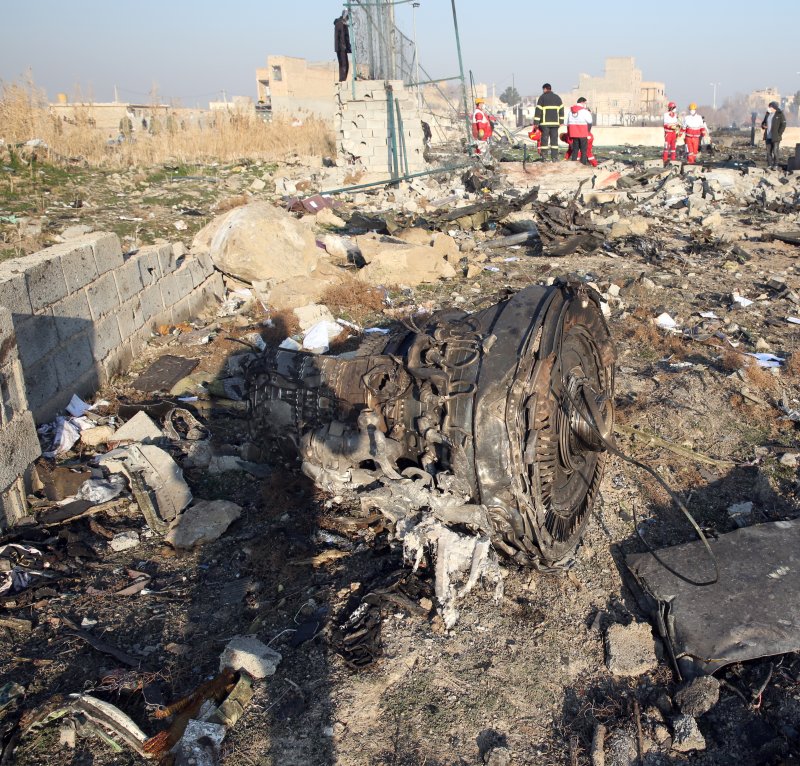Iran's military shot down an Ukraine International Airlines flight in Tehran on Jan. 8, 2020, killing 176 people on board. Photo by Abedin Taherkenareh/EPA-EFE
Feb. 23 (UPI) -- A U.N.-appointed independent investigator has accused Iran in a condemning letter of committing numerous human rights violations before, during and after its military shot down a Ukrainian airliner early last year, killing 176 people on board.
Released to the public on Tuesday, the damning 45-page letter delivered to Iran in December by Agnes Callamard -- the U.N. special rapporteur on extrajudicial, summary or arbitrary execution -- details the conclusions of her 6-month investigation into the shoot down, accusing Iran of numerous violations that leave unanswered the question of whether the civilian flight was intentionally targeted.
"I have found no concrete evidence that the targeting of that particular plane was intentional and premeditated. However, the inconsistencies in the official explanation and the reckless nature of the mistakes have led many including myself to question whether the downing of PS752 was intentional," she said during a virtual press conference about her findings.
The letter to Iran sought clarification on several issues but she said she has yet to receive a response.
Ukraine International Airlines flight PS752 from Tehran to Kiev was shot down shortly after takeoff by an Islamic Revolutionary Guard Corps air defense missile unit on Jan. 8, 2020, amid heightened tensions between the Middle Eastern country and the United States, which had days earlier assassinated in Iraq Qassem Soleimani, the then-head of the IRGC.
Iran for three days after the incident blamed the downed flight on an on board fire before admitting it had been shot down by two missiles launched from a military air defense unit that was placed near the civilian airport.
Tehran in July released a report that blamed the downed plane on "a chain of events initiated by a human error" that included a misalignment of the air defense unit and its operator being unable to communicate with their commanding officer for a matter of seconds before firing at the target they allegedly believed was a missile.
During the virtual press conference, Callamard said the inconsistencies of Iran's official explanation seem "designed to create a maximum of confusion and a minimum of clarity."
"As for the admitted mistakes, these indicate a reckless if not criminal disregard for standard procedures and the principles of precaution, which should have been implemented to the fullest given the circumstances and the location of the unit," she said.
Callamard detailed numerous contradictions and inconsistencies with Iran's explanation, stating Tehran has yet to identify why the missile unit was miscalibrated, why the miscalibration had not been detected and how it led to the plane's targeting.
She also said Iran has failed to explain why this civilian plane was targeted and not others departing and arriving at the civilian airport as well as why a second missile was launched 30 seconds after the first one given that once struck the plane's path and profile would not match the behavior of "a streaking incoming cruise missile."
There is also the inconsistency of Iran claiming the unit had only 10 seconds to decide whether to fire at the target though Callamard's investigation revealed it had at least a 45-second window if not longer to determine that it was a plane.
"Indeed, on the basis of the information received, one may even question whether the order or implicit encouragement by the chain of command [was given] to the crew on the ground to apply lethal force without going through standard procedures and precautionary steps," she said.
Callamard said Iran's failure to thoroughly and adequately investigate the shoot down amounted to a failure to respect the right to life and that there is evidence suggesting it destroyed and failed to protect evidence as it bulldozed the location, which was open to looters.
Tehran also violated the rights of the victims' families, she said, stating that they were subjected to harassment, threat and physical assault by Iranian authorities not only in Iran but in Canada, where many of the victims had ties to.
"The authorities allegedly also denied families access to the crash site and failed to return the entirety of the passengers' belongings to them with the result that many families are left without the smallest mementoes of those who lost their lives," she said, adding that authorities also threatened to withhold the victims' remains from families if they did not publicly declare support for the government.
"Many families were reportedly also denied private funerals. Victims were declared 'martyrs' who died for their country," the letter states. "... It is suggested that the labeling of those who died as 'martyrs' for Iran was forced upon them without their consent."
The letter comes months after Canada's special advisor to Prime Minister Justice Trudeau raised concerns in December over Iran's investigation into the disaster, stating that Tehran's probe "raises obvious concerns about credibility, conflicts of interests and a lack of transparency and accountability."
Among the victims of the flight, 138 had ties to Canada as either citizens or permanent residents though citizens of Iran, Afghanistan, Britain, Ukraine, and Sweden were also on board.















